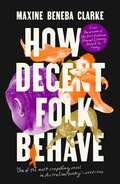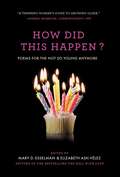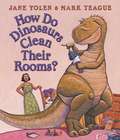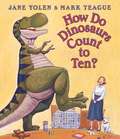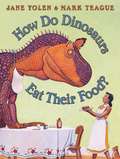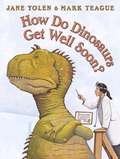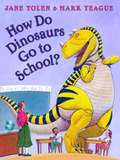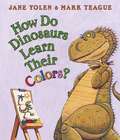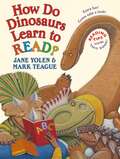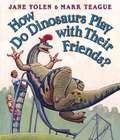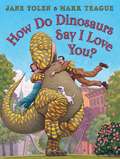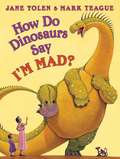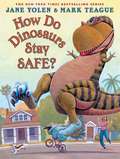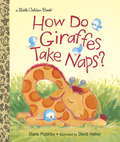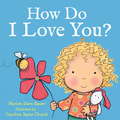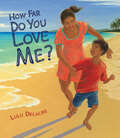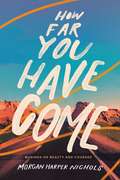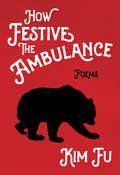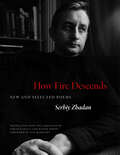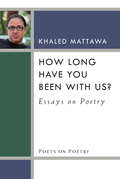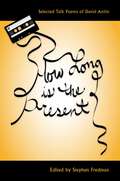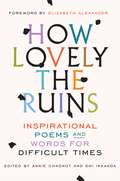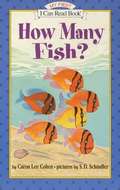- Table View
- List View
How Decent Folk Behave
by Maxine Beneba Clarkewe are all just one small disasteraway from sinking, and sometimes you only realisewhen you're gasping for airOn a daylight street in Minneapolis Minnesota, a Black man is asphyxiated - by callous knee of an officer, by cruel might of state, and under crushing weight of colony. In Melbourne the body of another woman has been found - this time, after catching a late tram home.The Atlantic has run out of the English alphabet, when christening hurricanes this season. The earth is on fire - from the redwoods of California, to Australia's east coast. The sea draws back, and tsunamis lash out in Samoa and Sumatra. Water rises in Sulawesi and Nagasaki. Bloated cod are surfacing, all along the Murray Darling.The virus arrives, and the virus thrives. Authorities seal the public housing towers up, and truck in one cop to every five residents. Notre Dame is ablaze - the cathedral spire blackened, and teetering.Out in Biloela, the deportation vans have arrived. Every Friday, in cities all across the world, children are walking out of school. The wolves are circling. The wolves are circling.These poems speak of the world that is, and sing for a world that may one day be.'One of the most compelling voices in Australian poetry this decade' Overland Literary Journal'a powerful and fearless storyteller' Dave Eggers'Readers are left with the sense they have been seen, heard and understood' Books + Publishing
How Did This Happen?: Poems for the Not So Young Anymore
by Mary D. Esselman Elizabeth Ash VelezFrom the bestselling authors of The Hell with Love, a fierce, funny, touching collection that takes the sting out of "aging while female."
How Do Dinosaurs Clean Their Rooms?
by Jane Yolen Mark TeagueThe bestselling, award-winning team of Yolen and Teague present their second original dinosaur board book, a playful "how-to" tale about making a mess and then cleaning it up. Come along for some BIG fun as your favorite dinosaurs learn to pick up and put away their toys. How do dinosaurs clean their rooms? With trash cans and dusters and brooms! Brimming with the same infectious humor as the other HOW DO DINOSAURS tales, this new board book is a perfect companion to the immensely popular picture books and a great baby gift as well. Image descriptions present
How Do Dinosaurs Count to Ten?
by Jane Yolen Mark TeagueCome along for some BIG fun as your favorite dinosaurs delight young readers with their playful antics. How do dinosaurs count to ten? Over and over and over again! Image descriptions present
How Do Dinosaurs Eat Their Food?
by Jane YolenThese terrible lizards have correspondingly terrible table manners; they burp, hurl spaghetti, and gleefully shove green beans up a giant reptilian nostril. Subsequent scenes of dinos "sit[ting] quite still" and beaming with "smiles and goodwill" offer examples of correct behavior; but even the mealtime "don'ts" offer useful information in hand-painted labels identifying each kaleidoscopically patterned creature. Don't miss queztalcoatus screeching at a restaurant waitress, or upersaurus inspecting his nutritious supper Kids will chortle over clever images of adults dwarfed by toothy miscreants, and both parents and children will recognize the hilarious parallels with occasionally naughty human kids who loom dinosaur-large within their respective households.
How Do Dinosaurs Get Well Soon?
by Jane YolenWhat if a dinosaur catches the flu? Does he whimper and whine between each "At-choo"? Does he drop dirty tissues all over the floor? Does he fling his medicine out of the door? Just like kids, little dinosaurs hate being sick. And going to the doctor can be pretty scary. How DO dinosaurs get well soon? They drink lots of juice, and they get lots of rest; they're good at the doctor's, 'cause doctors know best. From enormous sneezes to gigantic wails, the outrageous antics of the mischievous young dinosaurs in this book are sure to bring laughter to anyone who has ever said "Atchoo!"
How Do Dinosaurs Go to School?
by Jane YolenWhat would you do if a very large ceratosaurus stomped into your classroom? And what if the student sitting next to you was a gigantic silvisaurus -- who decided to jump on top of his desk? Come along for a very unusual day where dinosaur show-and-tell, story time, and recess antics will make even the best-behaved young dinosaurs laugh aloud. School has never been so much fun!
How Do Dinosaurs Learn Their Colors?
by Jane YolenThe bestselling, award-winning team of Yolen and Teague present their third original dinosaur board book, a fun read-aloud that teaches children all the colors of the rainbow.
How Do Dinosaurs Learn to Read
by Jane YolenAmerica's favorite dinosaurs romp and roar as they soak books in the bathtub, throw them, and finally learn how to carefully read them... with Mama and Papa at bedtime. Get ready to laugh at this lighthearted, heartwarming, and funny approach to books! Children sometimes feel the task of learning to read is overwhelming, but the winning combination of rhyme and illustrations here provide a perfect way to present the subject in a comical, engaging, and nonjudgmental way. The contrast of enormous dinosaurs in kid-sized bedrooms (with human parents) adds irresistible humor as families explore the do's and don'ts of reading. Both practical and engaging, this book shows dinosaurs getting into all sorts of reading-related trouble! But of course, in the end, the dinosaurs learn how to carefully handle their books, read out loud, and read a lot!
How Do Dinosaurs Play with Their Friends?
by Jane Yolen Mark TeagueCome along for some BIG fun as your favorite dinosaurs delight young readers with their playful antics.
How Do Dinosaurs Say Good Night?
by Jane YolenIn each playful spread of this read-aloud bedtime book, parents are ready to put their kids to bed-but these youngsters just happen to be dinosaurs! And though they may stomp and slam their tails a bit, in the end they act a lot like people-they give a big kiss, turn out the light, and whisper "good night".
How Do Dinosaurs Say I Love You?
by Jane YolenHow do dinosaurs say I love you? Little dinosaurs sometimes misbehave or make a mess, but no matter what they do, their mamas and papas always love them. With warmth and irresistible humor, award winners Jane Yolen and Mark Teague present readers with a familiar range of naughty childhood antics followed by dinosaur-sized kisses, hugs, and those three precious words that can never be said too often: I Love You!
How Do Dinosaurs Say Im Mad
by Jane YolenSome of them count to ten, some of them have a time out, and some of them take deep breaths. Then, when the dinosaurs are calm again, they clean up any mess they've made, they say, "I'm sorry," and they give big hugs. Just as you do.
How Do Dinosaurs Stay Safe?
by Jane YolenFrom crossing the street with Mama to encountering a stranger, the playful but careful antics of America's favorite dinosaurs will make readers laugh aloud -- and prompt discussion of safety issues. Few things in childhood are as important as learning how to behave safely, and the topic deserves discussion in every family. Now Jane Yolen and Mark Teague deftly approach this critical subject with warmth, humor, and hilarity. The wildly funny contrast between Teague's massive dinosaur children and their human-sized surroundings makes this subject especially appealing and funny. Where a book about safety for children might be potentially frightening, the antics of immense dinosaurs jumping on the bed or learning how to dial 9-1-1 on Mama's tiny phone will keep readers laughing from start to finish. Parents, children, teachers, and other caregivers need a comfortable way to discuss safety, and this book provides just that. And as children learn invaluable rules about safe behavior, they'll beg to read it again and again for the wildly appealing silliness on each page. Here is a book that belongs in every household!
How Do Giraffes Take Naps? (Little Golden Book)
by David Walker Diane MuldrowIt's naptime in the animal kingdom, and everyone from puppies to giraffes is curling up to get some rest. Whether it's snoozing under the sea or nesting high in the trees, little ones will enjoy learning about the various ways their favorite animals get their sleep. From the New York Times bestselling author Diane Muldrow (Everything I Need to Know series) and beloved illustrator David Walker (Bears on Chairs).
How Do I Love You?
by Caroline Jayne ChurchA heart-warming picture book about the power of unconditional love between a parent and a child, by bestselling artist Caroline Jayne Church.How do I love you? Let me count the ways.I love you as the sunloves the bright blue days.Through the seasons, and the ups and downs - love will shine through, whatever the weather. A charming exploration of love, using nature's many delights, to show just how much a child is loved.Caroline Jayne Church has won many awards and has sold over 6.5 million books worldwide.
How Does a Poem Mean
by John CiardiThere are many volumes designed to introduce college students to literature. What novelty can be claimed for this book comes from its plan. The four skilled and experienced teachers who have served as editors were not limited in their work by any imposed uniformity of treatment.
How Far Do You Love Me?
by Lulu DelacreThis unique bedtime book by award-winning author-illustrator Lulu Delacre features a game that highlights the universal love between caregivers and children while taking readers on a journey across the seven continents of Earth.How far do you love me?I love you to the top of the peakslit by the morning sun ...To the crests of the desert where the wind sweeps sand from the dunes ... Based on a bedtime game that author-illustrator Lulu Delacre played with her young daughters, How Far Do You Love Me? is an "I love you" book with a twist. With every expression of love, readers visit a different location around the world, each a beautifully illustrated scene of caregivers and children in a place of natural beauty. The intimate size of the book is just right for sharing and snuggling up close with a child. As bedtime--or any quiet time--approaches, gather close with a special person in your life and get ready to let your imagination soar to place after place as you embark on a game of "How far do you love me?" The possibilities are endless!
How Far You Have Come: Musings on Beauty and Courage
by Morgan Harper NicholsHow Far You Have Come is an exquisitely illustrated collection of poetry and essays from bestselling artist and writer Morgan Harper Nichols. In the midst of the hurt and the mundane, the questions and the not yets, we can forget just how far we have come. Morgan weaves together personal reflections with her signature poems to share her journey to reclaim moments of brokenness, division, and pain and re-envision them as experiences of reconciliation, unity, and hope.The stories and illustrations in How Far You Have Come are organized around a familiar path Morgan has traveled all her life, along the southern border of the United States. As Morgan reflects on the moments that shaped her, she invites us to:Awaken our hearts and recognize how our own histories have made us who we are todayHave a deeper understanding of pressing on and pressing in, of transformation and surrender, of meaning in the losses and wild anticipation for the splendor ahead Reclaim moments of brokenness, division, and pain and re-envision them as experiences of reconciliation, unity, and hopeBecome who we are in the moment you hold right nowA Wall Street Journal and Publishers Weekly bestselling author, Morgan has cultivated a loyal online community, over a million Instagram followers, and an in-person following as she shares her unique message around the country. How Far You Have Come is an excellent gift for college and high school graduations, faith celebrations and anniversaries, life transitions, and birthdays.
How Festive the Ambulance
by Kim FuIn this debut poetry collection by award-winning author Kim Fu, incantations, mythical creatures and extreme violence illuminate small scenes of domestic life and the banal tragedies of modern love and modern death.A sharp edge of humour slices through Fu's poetry, drawing attention to the distance between contemporary existence and the basic facts of life: "In the classrooms of tomorrow, starved youth will be asked to imagine a culture that kept thin pamphlets of poetry pinned to a metal box full of food, who honoured their gods of plenty by describing ingredients in lush language."Alternating between incisive wit and dark beauty, Fu brings the rich symbolism of fairy tales to bear on our image-obsessed age. From "The Unicorn Princess": "She applies gold spray paint to her horn each morning, / hoping to imitate the brass tusks / on the unicorns skewered to the carousel, / their brittle, painted smiles, harnesses / embedded in their backs and shellacked to high gloss." These poems are utterly of-the-moment, capturing the rage, irony and isolation of the era we live in.
How Fire Descends: New and Selected Poems (The Margellos World Republic of Letters)
by Serhiy ZhadanA searing testament to poetry’s power to define and defy injustice, from iconic writer-activist Serhiy Zhadan Since the Russian invasion of Crimea in 2014, the Ukrainian poet Serhiy Zhadan has brought international attention to his country’s struggle through his unflinching poetry of witness. In this searing testament to poetry’s power to define and defy injustice, Zhadan honors the memory of the lost and addresses the living, inviting us to consider what language can offer to a country threatened with extinction. Young lovers, marginalized outsiders, and ordinary citizens pulse with life in a composite portrait of a people newly unified by extremity. Even in the midst of enemy fire, Zhadan’s lyrical monuments beat with a subterranean thrum of hope. With a foreword by the poet Ilya Kaminsky, this selection of Zhadan’s poetry, forged entirely in wartime, is an homage to the Ukrainian people, a forceful reckoning with the violence of the past and present, and an act of artistic imagination that breaks with trauma and charts a new future for Ukraine.
How Long Have You Been With Us?: Essays on Poetry
by Khaled MattawaA volume in the Poets on Poetry series, which collects critical works by contemporary poets, gathering together the articles, interviews, and book reviews by which they have articulated the poetics of a new generation. "Like the myriad companions and comrades that he summons from their exile, Khaled Mattawa is himself a 'poet-stranger.' In the essays, 'written in a poet's prose,' collected in How Long Have You Been With Us, Mattawa evokes a powerful amalgam of the personal intimacy of the solitary and the political challenge of solidarity." --Barbara Harlow, University of Texas at Austin "If you've read about exile, you've read about Brodsky and Milosz--just as, if you've read about translation, you've read about Walter Benjamin and George Steiner. While Khaled Mattawa has mastered these masters, his essays about world literature serve as a tour of the rest of the world. He introduces you to the writers you haven't heard of but should from contemporary Libya and colonial South Asia to Latin America and China. When Mattawa invokes Saadi Youssef or Rabinidrath Tagore, Mohja Kahf or Toru Dutt, the effect is to deprovincialize American literature." --Ken Chen, The Asian American Writers' Workshop Khaled Mattawa, an American poet of Libyan origin, explores various dynamic developments shaping American poetry as it is being practiced today. Arising from an incredibly diverse range personal backgrounds, lyric traditions, and even languages, American poetry is transforming into a truly international form. Mattawa, who also translates Arabic poetry into American English and American poetry into Arabic, explores the poetics and politics of cross-cultural exchange and literary translation that fostered such transformation. The essays in this collection also shed light on Mattawa's development as a poet and provide numerous portraits of the poets who helped shaped his poetry.
How Long Is the Present: Selected Talk Poems of David Antin (Recencies Series: Research and Recovery in Twentieth-Century American Poetics)
by David AntinPoet, performance artist, and critic David Antin invented the &“talk poem.&” He insists that his poems be oral and created in front of a live audience, in a specific time and place, with the transcription of the performance adjusted for print by presenting it not in prose but in clumps of words without justified margins or punctuation, peppered with white spaces that indicate pauses.In this book, editor Stephen Fredman provides a critical introduction to a selection of talk poems from three out-of-print collections, accompanied by a new interview with the author. As Fredman points out, Antin&’s work is a form of conceptual writing that has influenced generations of experimental poets and prose writers. His profound and humorous talk poems are essential for classroom and scholarly discussions of the arts in modernism and postmodernism—offering as well an invitation to strengthen the ties between the sciences and the humanities.
How Lovely the Ruins: Inspirational Poems and Words for Difficult Times
by Elizabeth Alexander Annie Chagnot Emi IkkandaThis wide-ranging collection of inspirational poetry and prose offers readers solace, perspective, and the courage to persevere.In times of personal hardship or collective anxiety, words have the power to provide comfort, meaning, and hope. The past year has seen a resurgence of poetry and inspiring quotes—posted on social media, appearing on bestseller lists, shared from friend to friend. Honoring this communal spirit, How Lovely the Ruins is a timeless collection of both classic and contemporary poetry and short prose that can be of help in difficult times—selections that offer wisdom and purpose, and that allow us to step out of our current moment to gain a new perspective on the world around us as well as the world within. The poets and writers featured in this book represent the diversity of our country as well as voices beyond our borders, including Maya Angelou, W. H. Auden, Danez Smith, Rumi, Emily Dickinson, Naomi Shihab Nye, Alice Walker, Adam Zagajewski, Langston Hughes, Wendell Berry, Anna Akhmatova, Yehuda Amichai, and Robert Frost. And the book opens with a stunning foreword by Elizabeth Alexander, whose poem “Praise Song for the Day,” delivered at the inauguration of President Barack Obama, ushered in an era of optimism. In works celebrating our capacity for compassion, our patriotism, our right to protest, and our ability to persevere, How Lovely the Ruins is a beacon that illuminates our shared humanity, allowing us connection in a fractured world.Includes poetry, prose, and quotations from: Elizabeth Alexander • Marcus Aurelius • Karen Armstrong • Matthew Arnold • Ellen Bass • Brian Bilston • Gwendolyn Brooks • Elizabeth Barrett Browning • Octavia E. Butler • Regie Cabico • Dinos Christianopoulos • Lucille Clifton • Ta-Nehisi Coates • Leonard Cohen • Wendy Cope • E. E. Cummings • Charles Dickens • Mark Doty • Thomas Edison • Albert Einstein • Ralph Ellison • Kenneth Fearing • Annie Finch • Rebecca Foust • Nikki Giovanni • Stephanie Gray • John Green • Hazel Hall • Thich Nhat Hanh • Joy Harjo • Václav Havel • Terrance Hayes • William Ernest Henley • Juan Felipe Herrera • Jane Hirshfield • John Holmes • A. E. Housman • Bohumil Hrabal • Robinson Jeffers • Georgia Douglas Johnson • James Weldon Johnson • Paul Kalanithi • Robert F. Kennedy • Omar Khayyam • Emma Lazarus • Li-Young Lee • Denise Levertov • Ada Limón • Henry Wadsworth Longfellow • Nelson Mandela • Masahide • Khaled Mattawa • Jamaal May • Claude McKay • Edna St. Vincent Millay • Pablo Neruda • Anaïs Nin • Olga Orozco • Ovid • Pier Paolo Pasolini • Edgar Allan Poe • Claudia Rankine • Adrienne Rich • Rainer Maria Rilke • Alberto Ríos • Edwin Arlington Robinson • Eleanor Roosevelt • Christina Rossetti • Muriel Rukeyser • Sadhguru • Carl Sandburg • Vikram Seth • Charles Simic • Safiya Sinclair • Effie Waller Smith • Maggie Smith • Tracy K. Smith • Leonora Speyer • Gloria Steinem • Clark Strand • Wisława Szymborska • Rabindranath Tagore • Sara Teasdale • Alfred, Lord Tennyson • Vincent van Gogh • Ocean Vuong • Florence Brooks Whitehouse • Walt Whitman • Ella Wheeler Wilcox • William Carlos Williams • Virginia Woolf • W. B. Yeats • Saadi Youssef • Javier Zamora • Howard Zinn
How Many Fish? (I Can Read! #My First Shared Reading)
by Caron Lee CohenA story of six fish and six feet interact underneath the water. When one fish gets lost under a bucket, the feet unknowingly saves the fish.
